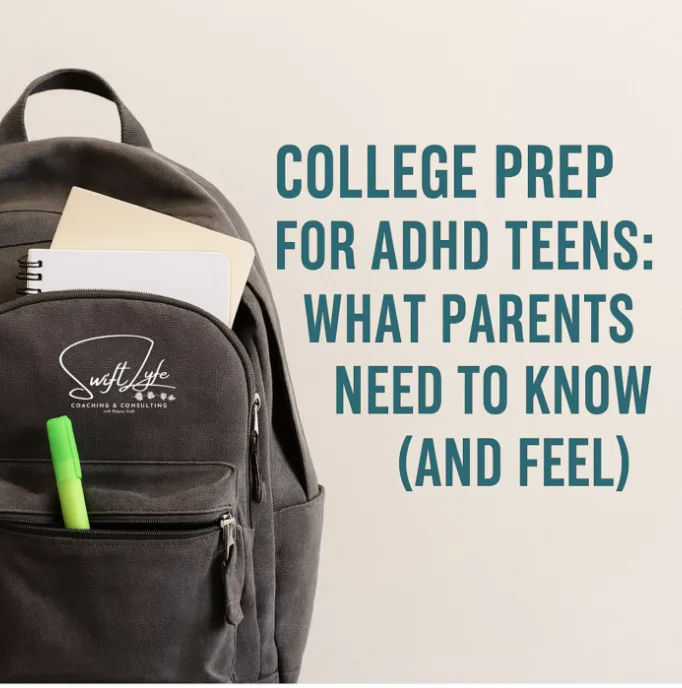August 5th
On August 22nd, I’ll help move my daughter into her college dorm.
I’ve been prepping teens for this moment for over a decade—as an educator, IB coordinator, and ADHD coach. But now, I’m living it as a mom.
And let me tell you… nothing prepares you for the mix of pride, anxiety, grief, hope, and logistical chaos that comes with launching your ADHD teen into young adulthood.
It’s not just about packing.
It’s not just about paperwork.
It’s about letting go—and still holding on to the pieces that matter.
If you’re walking this road too, here’s what I’ve learned—and what might help you and your teen make this transition with more clarity and confidence.
🎒 Section 1: The Practical Prep
Let’s start with the tactical to-dos that sneak up fast if you’re not ready.
🔹 Medical Power of Attorney + HIPAA Forms
Once your child turns 18, you lose legal access to their medical information. Even in an emergency.
Setting up a medical power of attorney (and HIPAA release) allows you to be contacted or make decisions if needed.
You can find free templates online or consult with your pediatrician or primary care provider.
🔹 ADHD Medication Management
Is your teen responsible for their meds yet? If not—now’s the time to practice.
Some things to set up in advance:
- A consistent refill schedule
- Pharmacy access near campus
- A pill organizer and reminder system
- A plan for medication storage (especially if living with roommates)
Help them understand why it matters—so you’re not chasing them down every week to check.
🔹 Accommodations Through Disability Services
If your teen had a 504 Plan or IEP in high school, they’re not automatically transferred to college.
Your student must:
- Contact the college’s Disability Services office
- Submit documentation (often a neuropsych or diagnosis letter)
- Schedule an intake meeting to set up accommodations
Encourage them to lead the communication process—with your backup support if needed.
🔹 Executive Functioning Scaffolds
Executive function doesn’t magically mature at 18.
Now’s the time to help them practice:
- Keeping a digital calendar or planner
- Meal prepping and grocery shopping
- Doing laundry (without running out of socks first)
Scheduling their own appointments
Small reps now lead to big confidence later.
🔹 Placement Tests, Immunizations, and Insurance
Knock out the extras before orientation, like:
- Language or math placement exams
- Updated immunization records
- Understanding what their insurance covers (and what it doesn’t)
💛 Section 2: The Emotional Work
This is the part that sneaks in quietly—between the packing tape and the tuition payments.
💬 Letting Go of Control
They’ll make mistakes.
They’ll forget things.
And they’ll figure it out.
Your job is shifting from manager to mentor. Not easy—but necessary.
🌀 Facing the Fear of Regression
What if they melt down?
What if they ghost their professors?
What if they drop the ball?
Deep breaths.
College is a place for growth, not perfection. And setbacks are part of the process.
✨ Focusing on Growth, Not Control
Notice the wins. Celebrate the effort.
Progress over perfection—especially for ADHD teens.
Even if they’re just learning to ask for help or advocate for themselves, that’s HUGE.
🧘🏽♀️ Regulating Yourself So They Can Regulate Themselves
They feed off our energy.
If we’re spiraling, they spiral.
If we’re grounded, they might still spiral—but they’ll have a soft place to land.
🤝 Section 3: What Both Parents & Students Need
This isn’t a one-way launch. Everyone needs support.
✅ Clear Expectations
Talk about communication, finances, academic goals, and boundaries before they leave.
Write it down if needed.
✅ Connection Without Micromanaging
Set a weekly check-in day.
Not to control them—just to connect.
✅ Contingency Plans
What if they’re struggling?
What’s the plan if they need to take a leave, get therapy, or shift majors?
It’s not pessimism—it’s preparedness.
✅ Community
No one should do this alone.
Find support through:
- Coaching
- Peer accountability groups
- Therapy
- ADHD-friendly campus resources
And yes, support for you, too.
🛫 Conclusion: It’s Their Launch… And Yours
This transition isn’t just theirs—it’s yours too.
It’s okay to grieve.
It’s okay to be scared.
And it’s more than okay to be proud.
Let yourself feel all of it—even if you cry in the Target parking lot after move-in day.
You’re not doing it wrong.
You’re doing it real.


